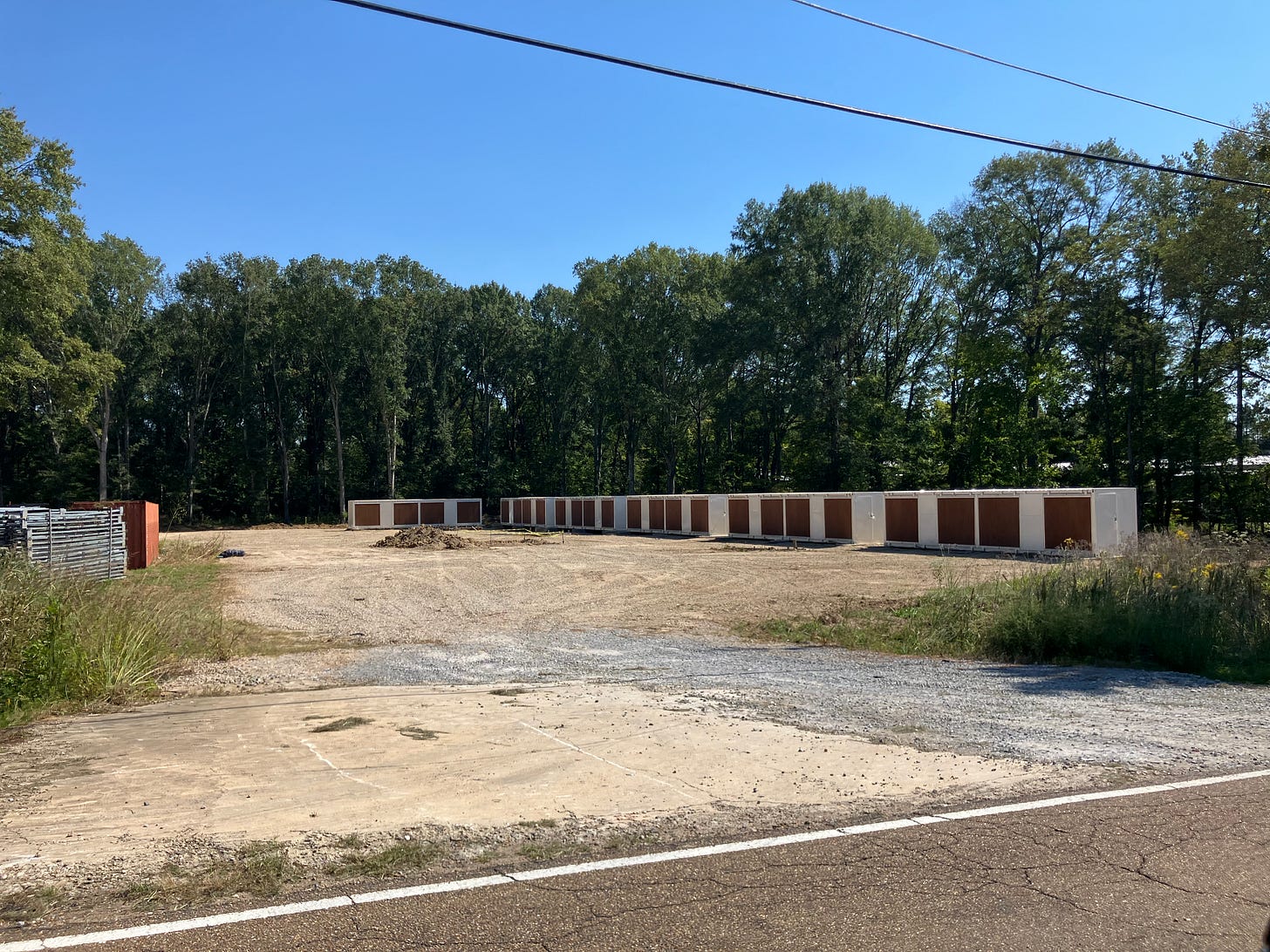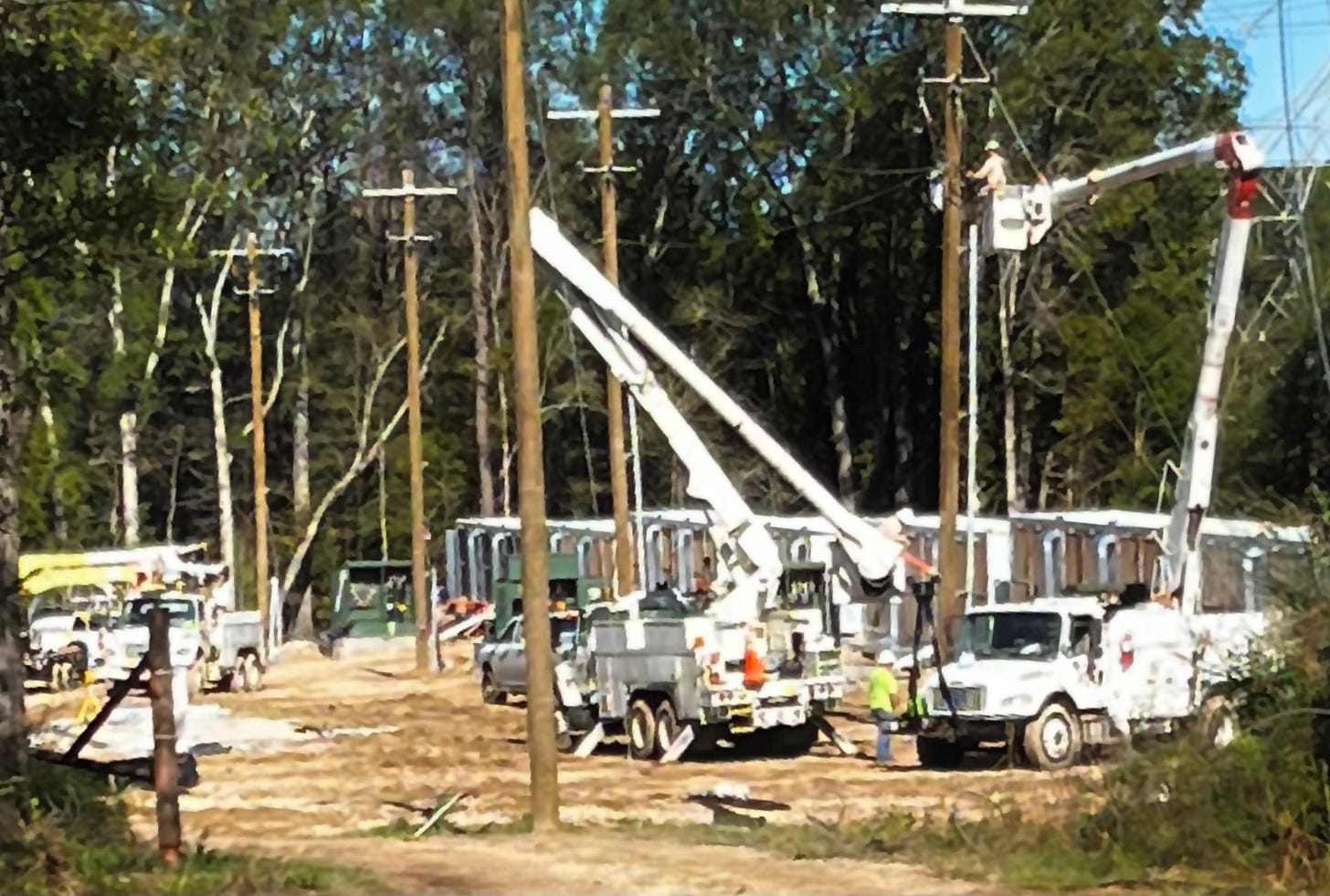Channeling cryptocurrency in a Mississippi industrial park
Facilities expected to go online by Dec. 6, 2024
When the Las Vegas company CleanSpark Inc. announced the construction of two multimillion-dollar bitcoin mining facilities in the vicinity of Clinton, Mississippi in September 2024, the precise locations were not specified.
CleanSpark’s news release noted only that the facilities would be built in or near Clinton at a cost of $5.775 million (“the combined purchase price”), with a projected completion date of Dec. 1, 2024. The company later reported that the facilities were finished on Dec. 2, 2024, and expected to be operational by Dec. 6.
CleanSpark’s selection of a town not noted for its tech infrastructure, and the absence of location specifics, prompted a Clinton resident to ask The Mississippi Independent what else might be known about the projects and what, exactly, a bitcoin mine entails.
For many people, cryptocurrency is an unfamiliar realm, though bitcoin has been in the news lately due to the involvement of Donald Trump and Elon Musk. Crypto is, by nature, cryptic. It is also volatile and sometimes controversial, owing to its potentially nefarious use, which has led some countries to ban crypto mining altogether. But, as this site noted, bitcoin shares traded at all-time highs following Trump’s presidential election win, and most analysts “anticipate a more favorable regulatory environment under Trump, who has positioned himself as pro-crypto.”
Yahoo Finance reported in October 2024 that Musk’s Tesla electric car company, which reportedly holds the fourth-largest bitcoin stash among public companies in the United States, had moved about $765 million worth of bitcoin to “unidentified wallets.” Musk is also involved in the cryptocurrency Dogecoin and is slated to head up a new Trump administration agency called the Department of Government Efficiency, or D.O.G.E.
Bitcoin and other cryptocurrencies are decentralized global financial systems designed to bypass government-issued and regulated currency. Its funders are unidentified and transactions cannot be traced. Secrecy is one of its hallmarks. Though crypto is largely unregulated, that is changing due to its use by criminal networks, for various mining-related environmental issues, and as a result of a series of bank collapses that were tied to crypto asset activities. Government restrictions have driven bitcoin miners out of some countries and into others, including the U.S.
CleanSpark, which owns and operates mining centers in seven states and calls itself “America’s Bitcoin Miner®,” is not well known outside the crypto universe. A search of published reports about the company produced mostly links to trade sites, such as an article which reported that on Nov. 8, 2024, Nasdaq halted trading in CleanSpark shares due to what was described as a “clerical warrant conversion error.” According to the company’s account, the interruption was unrelated to its business operations, SEC filings, financial statements or securities. Trading has since resumed.
Locating CleanSpark’s mining sites, which were described in published reports as “in or around” Clinton, involved searches of records filed with the Mississippi Secretary of State’s office; online documents related to the company’s business associations; Hinds County land transactions; and, ultimately, site visits, which led to two parcels in the Clinton Industrial Park near I-20 West. One is a small, nondescript property beside a railroad track on Industrial Park Drive. The other is a formerly undeveloped parcel near a high power line right-of-way north of the I-20 frontage road. Both were being outfitted with a series of prefab pods that resemble storage units.
In late November 2024, the frontage road site buzzed with activity by Entergy utility crews connecting the pods to power lines.
Though “bitcoin mining” suggests some type of physical excavation, the process is entirely digital and utilizes self-contained computer modules connected to the electric utility grid. Though it involves the transfer of billions of dollars’ worth of crypto globally and draws volumes of electricity equivalent to the usage of many entire countries, the individual mining sites are often unobtrusive. The Clinton sites are comparatively small and there are no high security fences nor is there significant physical disruption.
Even a simplified explanation of bitcoin mining can be difficult to parse for the uninitiated. As this site notes, “Bitcoin mining is the process by which transactions are officially entered on the blockchain. It is also the way new bitcoins are launched into circulation.” The process “is conducted by miners using hardware and software to generate a cryptographic number that is equal to or less than a number set by the Bitcoin network’s difficulty algorithm.” A rough translation is that bitcoin mining involves the creation, validation and movement of bitcoin by individuals, groups of companies that reap financial rewards, also in bitcoin. Validation is key, given that crypto is vulnerable to digital fraud.
As this article in the New York Times reported, bitcoin’s origins date to 2008, when “an unknown person or persons using the name Satoshi Nakamoto published a proposal to create a cash-like electronic payment system” that skirted conventional government regulation and monitoring. In the years since, bitcoin’s valuation has proved highly volatile. Another Times article, from 2023, estimated that a single bitcoin could be worth as much as $170,000, though it sometimes drops far below that.
Transactions are simple but require authentication, which the article described as a time-sensitive “guessing game” aimed at validating the relevant bitcoin and entering legitimate transactions into bitcoin ledgers. Due to the risk of abuse, the system is designed to encourage would-be hackers to instead devote their energy to their own bitcoin mining. The guessing game relies upon “powerful, and power-hungry, computers to try to beat out others,” the Times noted. The computers often perform trillions of calculations per second.
That last detail evokes a major source of controversy around bitcoin mining sites: their massive consumption of electricity. The Times reported that bitcoin mining can create “higher electricity bills and enormous carbon pollution -- for everyone around them, most of whom have nothing to do with Bitcoin.” According to the article, increased demand has caused electric bills for some power customers to rise nearly 5 percent, or $1.8 billion per year.
Though bitcoin mining centers such as those that CleanSpark located in Clinton appear to be low impact, such sites have faced opposition elsewhere due to the noise they generate and their excessive electricity demand, which can lead to rolling blackouts during periods of heavy area usage, such as result from heatwaves or other extreme weather events. There are also concerns about environmental impacts, given that the electrical consumption is dependent upon fossil fuels, and about excessive water use.
According to the same Times article, mining a single bitcoin requires the equivalent of nine years’ worth of electrical consumption by a single-family home. For the industry as a whole, usage is close to half-a-percent of all the electricity consumed in the world and is rapidly increasing. U.S. bitcoin mining also requires annual water consumption equivalent to that of a city the size of Washington, D.C., the article noted.
Because large sums of money are in play, time is of the essence in validating bitcoin transactions, which partly explains the massive electrical use. As the Times reported, the first miner to validate a standard “block” of bitcoin transactions is rewarded with 6.25 newly minted bitcoins, which can be worth hundreds of thousands of dollars. The more computers devoted to the process, the quicker the validation can take place and the more power is consumed, not only for operating systems but for cooling the computers, which run nonstop, sometimes in giant data centers. Because the process requires constantly updated software and hardware, it also creates huge volumes of e-waste.
The combination of environmental and energy issues, legal abuses and general financial disruption prompted China – formerly the world leader in bitcoin mining – to create new restrictions and eventually to impose an outright ban, which sparked industry growth in the U.S., including in Texas and now, Mississippi.
The Texas Tribune reported that when the cost of electricity is high in that state, some bitcoin miners switch to selling pre-purchased power back to the grid, and may make more money that way than through the mining itself. According to the magazine, the ability to resell dedicated electricity for others’ use illustrates that the system is geared toward benefiting businesses over consumers.
China banned crypto mining in 2021, and Texas now hosts half of the 10 largest bitcoin mines in the U.S., according to the Tribune, which noted that the state’s more than 20 industrial-scale bitcoin mining operations collectively consume up to 2,300 megawatts of energy per day -- enough to power about 460,000 homes during times of high demand. That has caused concern because the state’s utility grid is notoriously unstable, yet Texas is generally politically conservative – as are many bitcoin operators – and pro-energy, particularly when it comes to oil and gas production. More bitcoin mines result in greater electricity demand and, in turn, greater consumption of fossil fuels.
Because bitcoin is pseudonymous, its use by criminals has attracted the attention of regulators, leading to its banning by several countries. Among the illicit activities are money laundering and the financing of terrorist operations. Cryptocurrencies are also used for scams and frauds and are themselves subject to digital theft. Though there have been efforts to increase crypto regulation in the U.S., analysts don’t expect them to gain much traction during the Trump administration.
Few studies have been done of the potential health hazards of bitcoin mines, but Time magazine reported that residents of one Texas town suffered from odd maladies which they believed were linked to a massive local bitcoin mining center. According to the article, “a dull aural hum had crept into their lives, which growled or roared depending on the time of day, rattling their windows and rendering them unable to sleep. The hum, local law enforcement had learned, was emanating from a Bitcoin mining facility that had recently moved into the area -- and was exceeding legal noise ordinances on a daily basis.” The article reported that similar medical complaints have been registered near facilities in Arkansas and North Dakota. The bitcoin mining industry is meanwhile “urgently trying to push bills through state legislatures, including in Indiana and Missouri,” which would exempt the sites from local zoning or noise ordinances, and Oklahoma has passed a “Bitcoin Rights” bill to protect miners and prevent any future attempts to ban the industry.
According to Time, the noise in the Texas town emanated from thousands of fans used to cool equipment inside the mining pods. “As more machines were switched on, the noise sounded like a ceiling fan, then a leaf blower, then a jet engine,” and could be heard for miles, the article noted.
Based on site visits and published reports, CleanSpark’s Clinton mines are comparatively small and are located in areas largely devoted to industrial use, though the frontage road site is near to several residences.
The Mississippi Independent reached out to a CleanSpark spokesperson for more details about the facilities, and about the passage of the Dec. 1, 2024, completion date. The spokesperson replied by providing a link to the company’s investor announcement.
CleanSpark’s corporate history is complicated to parse, based on public documents. The Mississippi Secretary of State’s office lists CleanSpark MS LLC as having been incorporated in February 2024 with officers Zachary Bradford and Leighton Koehler, both of Henderson, Nevada. Also included is the Nevada registration of CleanSpark Inc. which was originally incorporated in 1987 to provide energy grid consulting.
The same month that CleanSpark was incorporated in Mississippi, the Jackson Clarion Ledger reported (via Nexis) that CleanSpark of Georgia had bought three Mississippi sites, in Vicksburg, Meridian and Wiggins, from “a Chinese company,” and owned another site in Iuka (the Clinton sites came later). According to the article, the Vicksburg site was the largest, with a 17,500-square-foot building on five acres, followed by the Wiggins facility (10,500 square feet on nine acres) and the Meridian facility (5,500 square feet on five acres). No information was provided about the Iuka site. In its own announcement, CleanSpark said it had acquired three turnkey sites in Mississippi, without naming specific locations, for $19.8 million. This site reported that it “appears” the sites were acquired from MakerStar Capital.
Land records in Hinds County, where the Clinton sites are located, include no property in CleanSpark’s name. Among several CleanSpark contracts found online, however, is this one, dated Sept. 16, 2024, between a seller identified as Eyas Investment Group Limited (formerly Coinmaker Miners Limited, a British Virgin Islands company) and buyer CSRE Properties Mississippi LLC, with Makerstar Capital Inc. listed as guarantor. The document indicates Eyas owned interest in an entity named Clinton16.5 LLC, a Mississippi limited liability company, which conveyed undescribed assets to CleanSpark-affiliated CSRE for $2,187,500.
Hinds County lists two properties in the name of CSRE: the parcel on Industrial Park Drive where the first group of prefab pods appeared in September 2024, which was formerly owned by MakerStar; and the parcel on the I-20 frontage road where Entergy crews were observed hooking up several prefab pods to power lines, which was also formerly owned by MakerStar.
There is also this real estate agreement from Sept. 16, 2024, between MakerStar Capital, Inc. of Irvine, Calif. and CSRE (c/o CleanSpark, Henderson, Nev.) conveying property in the city of Clinton for $700,000. Two listed parcels are the sites on the I-20 frontage road and on Industrial Park Drive. Also included is a construction agreement is between CSRE and Beast Power, Inc. of Irvine, Calif., for $2,887,500. The owner is described as “CleanSpark, Inc., Clinton16.5 LLC, and their respective affiliated companies.”
The Mississippi Secretary of State’s office lists CSRE Properties as having been incorporated in February 2024 as a lessor of real estate. The office also lists CSRE Properties Vicksburg LLC and Clinton16.5 (formerly Ellisville15 LLC) with Shengyin Chen as manager. Clinton16.5’s 2024 annual report was filed by Zhuo Zhang of Torrance, Calif.
According to a Dec. 3, 2024, CleanSpark investors release, the two Clinton facilities were completed on Dec. 2 and were expected to be operational by Dec. 6. The release, which did not specify the number of mining pods, noted in trade terms that the facilities would utilize “S21 pro miners with an expected combined operating hashrate of approximately 1 EH/s.” A S21 pro miner is bitcoin-specific equipment that utilizes an algorithm for different forms of the cryptocurrency. EH/s is a measure of the computational power of a proof-of-work (or validation) crypto network, group or individual and is used to adjust the blockchains’ puzzle-solving difficulty.
Such details are not likely familiar to anyone not well versed in cryptocurrency, but in this case hashing is the process of guessing a randomly generated code (or as close to it as possible) associated with a bitcoin transaction. Each guess submitted by computers on the network is measured; the hash rate is how many guesses per second are occurring on a single miner, pool, or across an entire network, according to Investopedia.
The Dec. 3 CleanSpark release reported that the company has mined an average of 20.72 bitcoin daily at its sites and sold 26.11 bitcoin during November 2024, at an average price of approximately $84,356 per bitcoin.
By then, fences and landscaping had appeared at the mining site along Industrial Park Drive in Clinton, looking strangely inconsequential, and featuring evergreen tree plantings, new decorative fencing and two portable, flashing surveillance lights. Beyond it, via fiber optic cables, lay a strange, new world.
For a passerby, there was this, accompanied by a quiet roar:
Images: Bitcoin illustration via Creative Commons; CleanSpark Industrial Park Drive site (author); Entergy crews at frontage road site (courtesy Lee Harding)






